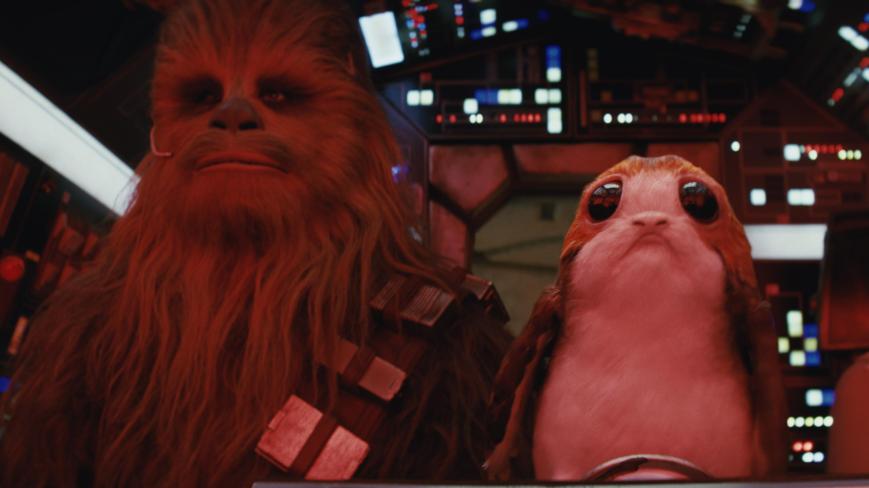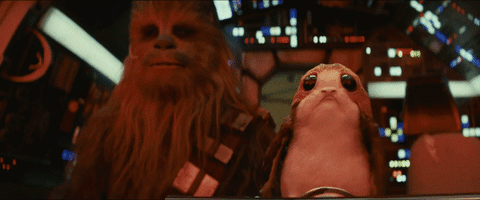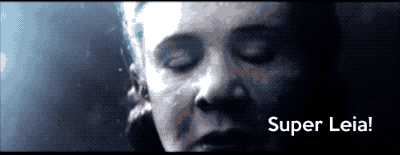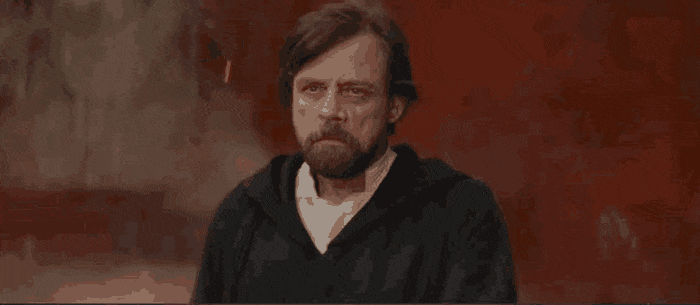
OH MY GOD THERE ARE SPOILERS BELOW.
(in fact, it’s better if you’ve seen the movie)
Consider the above picture of Chewbacca. I felt that way leaving the theater after being bludgeoned by THE LAST JEDI. Confused, numb, and vaguely constipated. And we both endured the movie strapped-in next to an irritating juvenile presence. His is a furry penguin that shames him into veganism; mine was a dumb kid who couldn’t stop talking at the movie.
Sample dialogue:
[LUKE WINKS ON-SCREEN]
Dumb Kid: Luke just winked.
Alas, that level of analysis is pretty much what THE LAST JEDI deserves. But not what it’ll get. Because I’m cranky.

Imagine that writer/director Rian Johnson fancies himself a chef. Now imagine you’re invited to an exclusive Dinner-for-One created by writer/director/chef Rian Johnson that is inspired by his hot new blockbuster, STAR WARS: THE LAST JEDI. What would that dinner be like?
Here’s what it would be like.
The tuxedo’d waiter would arrive, set down a covered silver platter, and dramatically pull the cover off to reveal a Twinkie. “Awesome!” you think, “I love Twinkies!” And so you eat the Twinkie.
For the next course, the tuxedo’d waiter brings another silver platter. He bows deeply and, in a grand swooping motion, whips off the cover to reveal…
Another Twinkie.
“Huh,” you think. “Whatever. They’re fucking delicious.”
So you start working on that Twinkie but, before you finish, a different tuxedo’d waiter brings another Twinkie on a silver platter. So you cram the second Twinkie down and start on the third, but before you can even choke down the first bite, yet another tuxedo’d waiter has brought a fourth Twinkie.
And then a fifth.
And then, to save time, a different waiter simply tosses an unopened two-pack of Twinkies (numbers six and seven) onto the table. And you’re expected to eat them.
Soon your table is overflowing with Twinkies, but you soldier on! It’s a Star Wars movie, goddamnit, and there’s still two hours left!
On the twelfth Twinkie, the sugar surge lifts your pulse to 130 BPM.
On the seventeenth Twinkie, your vision starts to blur.
On the twenty-eighth Twinkie, your internal organs shut down. Your spirit detaches from your corporeal body. And in the twilight between life and death, it drifts against the flow of the Twinkie-bearing waiters, toward the kitchen. It floats through the swinging doors and there, wearing his chef’s whites, Rian Johnson gestures at a forklift to set down the next pallet of Twinkies. He leaps atop the pallet and bellows at the waiters to move faster, faster, FASTER. More, more, MORE!
The waiters speed up; sweat drips. They mop it up with the only thing available–more Twinkies–and they continue streaming out to the dining room.
Your dispirited spirit floats after them.
The small army of tuxedo’d waiters has been busy. White creme filling oozing out of your slack mouth, your unconscious body has been hoisted up on the table and is slowly being buried by a growing mountain of Twinkies. To keep up the pace, the waiters just burst through the swinging doors, throw their Twinkies at the table, then wheel around to reload.
Soon the sheer weight of Twinkies crushes the table. The floor groans under the weight, then it buckles and falls through, taking out the foundation and bringing the building down on itself. There are no survivors except the bathroom attendant.

Or, to put it more succinctly…
THE LAST JEDI is breathless and overstuffed. But not in a way that’s cathartic or satisfying. And certainly not in a way that exhibits storytelling deftness or restraint. You could describe the plot like this:
Something happens–something hap–something ha–something–someth–some–som-so-so-so-s. End.
The plot is a seemingly endless series of break-neck escapades. It crams in set piece after set piece with a sprinkling of lame John Ford-esque chuckle jokes to kill any quiet moments. And these escapades lack drama for a number of reasons, the most egregious being an over-reliance on plot points of convenience. These include: deus ex machina resolutions, unexplained rule changes, incidences of pure happenstance, and contrived “dramatic” moments. These plot points of convenience deflate any organic build-up of tension. Which is shit. But they also give the writer a shortcut to move to the next set piece with all possible speed. Which is also shit, but it’s the M.O. of this movie.
The deus ex machina resolutions (when an unexpected force saves a hopeless situation) are a hallmark of action flicks. Every time our hero is seemingly defeated by the bad guy but then, out of nowhere, a previously unconscious/grievously wounded secondary character pops up to shoot the bad guy–this is a deus ex machina. The Star Wars series is no exception. A NEW HOPE: Han Solo appears out of nowhere to cover Luke on the original Death Star trench run. THE LAST JEDI: Luke appears out of nowhere to hold off the First Order assault at Helm’s Dee–er, the Rebel stronghold. Need a way to end Rey and Kylo’s lightsaber duel without either person winning? Just have an explosion knock them unconscious.
These types of resolutions are kind of like a jump scare in a horror film–a cheap effect that’s part of the genre landscape. The problem is that a deus ex machina takes the pressure off a desperate character to resolve their own situation. Their own agency doesn’t bring about the resolution–it’s the hand of god (the writer).
The next plot point of convenience is a personal bugaboo of mine–the unexplained rule change. This is when a film betrays its own world-building. This would be like if in JURASSIC PARK, the writers decided halfway through that this particular T-Rex actually can see unmoving things just so it can eat Jeff Goldblum and make us cry.
It’s like when we know Princess Leia kinda maybe has some Force powers-ish, sorta, but then is suddenly a Jedi master who’s able to survive being blown up and exposed to outer space and floats back to safety during a battle! Or it’s like the first six movies setting up how much rigorous training is required to become a real Jedi (backpacking Yoda on Dabogah, listening to Liam Neeson’s dour advice, etc.) but then we get Rey who exhibits super-advanced Jedi abilities without even a watching a “Top 5 Jedi Hacks” YouTube video. It’s like going into God Mode in DOOM (you remember that, right, you old-ass bastard). It’s fun for a minute. But it’s still a cheat.
When you bend rules to accommodate plot points like this or choose not to explain the changes, you shake the load-bearing walls of the your story. That’s bad. What can the audience trust if these rules are broken for convenience’s sake?
Incidences of pure happenstance. This is a repeated sin in the last two Star Wars flicks and fairly self-explanatory. How do we get the Millenium Falcon into the movie? Have our hero stumble upon it, randomly. How do we get Luke’s lightsaber into the movie? Have our hero stumble upon it, randomly. How do we get Finn and Rose out of this casino jail and have them find an expert hacker before time runs out and everyone dies? Put an expert hacker in their jail cell. Randomly. Seriously. Then have the hacker break them out, steal a ship and save them again (deus ex machina, anyone?), and then pretty much complete their mission for them. (In this whole inane subplot, Finn and Rose’s sole contribution to the success of the mission is failing and getting thrown in jail.)
This is lazy. Appallingly so. Especially in a movie world that spans an entire galaxy. At least Indiana Jones had to hunt for the Holy Grail. It didn’t just show up in the men’s room at the University.
And, let’s not forget contrived “dramatic” moments. This involves creating a baldly emotional (and semi-exploitative) plot point. Take, for instance, Vice Admiral Holdo sacrificing herself through the tired “someone has the steer the ship so you can escape” plot maneuver. It allows this character to go out as a martyr but it doesn’t make much sense. There’s really no autopilot on the ship? If not, did droids and their sparkly little ship-steering fingers just disappear from the Star Wars universe suddenly and entirely? Uh, no. So why would one of the few remaining Rebel leaders sacrifice herself for no reason? I mean, other than creating a faux emotional moment…
These little burps of illogic create the martyrdom situation, yes, and her dramatic death, but it’s rendered meaningless if you think the writer forced it. Which I do. The moment begs for feelings, but it’s unearned.
One or two coincidences like these in a movie? Fine. But seventy-eight? Nope.

Now I know this “what if/that doesn’t make sense” game seems nitpicky. You can do it all day for a lot of movies. (But remember that a lot of movies are terrible.) However, when you’re world-building a story (or getting paid huge sums of money to play in an already-built world), you should adhere to the rules/logic that are there–out of respect for the audience. And yourself, I’d assume.
But the real disappointment for this type of sloppy storytelling isn’t just that it unnerves the nerds, but that it short-circuits the movie’s narrative tension. Because the majority of plot conflicts are resolved using these shortcuts, the story doesn’t create any real momentum. The resolutions aren’t earned; the conflict is just defused by the writer. Luke takes on an entire First Order army including Kylo Ren–awesome! But then it’s revealed to be a Force trick, and it’s not just the bad guys who are the butt of his joke, the viewer is too. We just don’t have time to realize it because we’re already onto the next Twinkie.
THE LAST JEDI attempts to cover up this weak story construction by racing through every sequence as if it’s trying to outrun its own stench–which it is. In a 2.5 hour-long action movie, speed is essential. But the pace is so breathless that the movie just skips over actually important (and earned) dramatic moments.
For instance: in THE FORCE AWAKENS, it’s established that finding Luke Skywalker would be a game-changer–the thing that would turn the tide of a war. The most important thing. And when Rey finally reaches him on Hobo Island, it’s a powerful moment. But when Luke finally shows up to help the Rebels in THE LAST JEDI, no one really gives a shit.
Similarly, Finn does everything in his power to reunite with Rey–even going as far as trying to abandon the Rebels. But when they’re finally in the same room at the end of the movie, they don’t even talk.
After Leia spacewalks from certain death, the characters blink and then move on.
Every moment in the story is given roughly the same dramatic weight. Luke’s death gets almost the same screen time and attention as the throwaway jokes involving the furry penguins on Hobo Island. When all moments have the same value, they’re rendered valueless.
And here’s the galling thing–the furry penguins (or, fine, Porgs) are irrelevant to not only the storyline of THE LAST JEDI, but also the entire Star Wars saga. Their function is to give the woefully under-used Chewbacca something to interact with and sell toys. Do you think selling toys is important to storytelling? I don’t. But the cynic in me understands this. You can’t make a toy of Luke Skywalker’s death. Or can you?
The scene is Timmy’s birthday party.
Mom: Open your present, Timmy! Oooh, what is it?
Timmy: It’s “Luke Skywalker’s Death!” So freakin’ cool!
HE HOLDS UP AN EMPTY BUNDLES OF ROBES.
And when time that should be spent on moments of significant storytelling weight–Luke’s death, Leia’s spacewalk, Rey and Finn reuniting–are spent instead on Porgs and the plight of stablehands working the intergalactic camel races, you just shake your head. In order to create dramatic weight in a story, you have to build up to a moment, give it space, devote time to it. The characters, the audience, everyone has to feel the significance of the moment.
THE LAST JEDI doesn’t do this. Things just happen. Because they might make a nice visual spectacle. Because they might scratch the surface of an emotion or theme. But mostly because this current thing has to end so the next thing can happen. And the next thing. And the next thing. And crystal foxes. And the next thing. Until it’s over and all these things are the same.
And this glaring weakness, sadly, doesn’t change THE LAST JEDI’s popular reception because potent nostalgia and the massive reach of Disney’s marketing budget ensures that if the movie flicks the audience’s dopamine button enough, if it splashes our favorite characters on-screen and things happen quickly enough so no one can really keep up, or care, pew pew pew–if it can do that, regardless of storytelling craft or quality, then it’ll make a billion dollars. And it did.